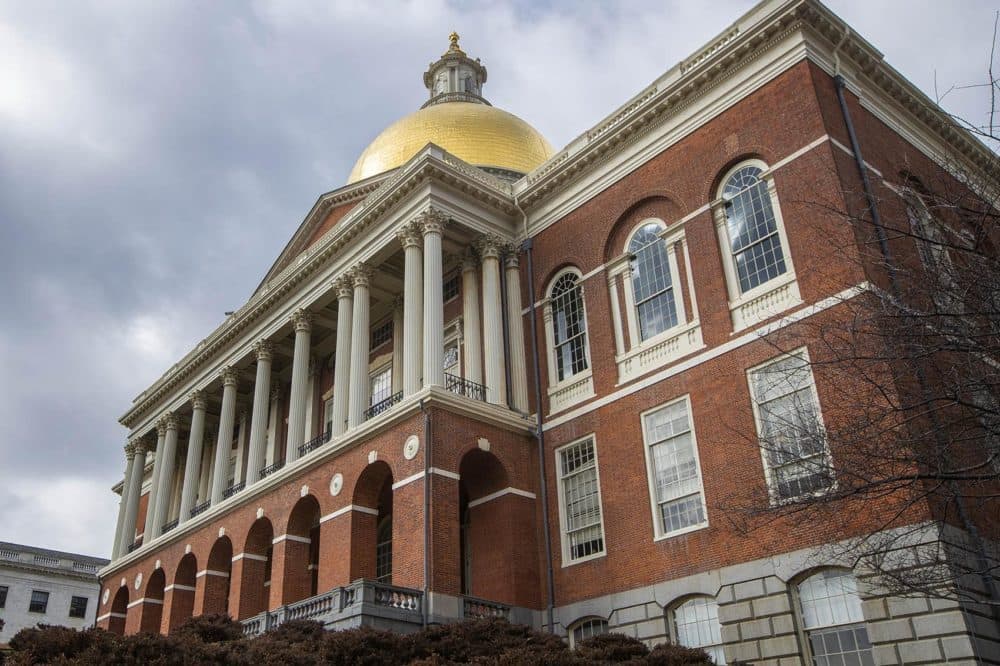Advertisement
Mass. State Leaders Unfazed By Missing July 1 Budget Deadline

Massachusetts, one of just two states where the legislature has not yet finalized an annual spending plan, rang in fiscal year 2020 on Monday operating under a temporary budget while lawmakers continued negotiations.
The fact that Democrats missed their July 1 deadline didn't bother Republican Gov. Charlie Baker, who said extra time at the negotiating table can ultimately result in a better budget.
"I don't have a problem with the budget being a week or two late," Baker told reporters after meeting with legislative leaders. "I care a lot more about the quality of work product and the completeness of that work product and giving people the ability to do the stuff that they need to do depending on where we are to finish the process."
Last week, while Baker was in London for an offshore wind conference, Lt. Gov. Karyn Polito signed a $5 billion interim budget bill, also known as a one-twelfth, that will keep state government programs and services running through the month of July.
"I've been involved in the course of my career in state government in 14 budgets, and I think of those 14 budgets, 11 of them came in after June 30," Baker said. "I would argue that in many cases the one-twelfth — which was an act passed by the Legislature and signed by the lieutenant governor last week which buys these guys some time to sort of work their way through the rest of the elements of this budget — usually ends up producing a better product than simply getting there by June 30."
While the government will remain open, policy language that differs between the House and Senate's $42.8 billion budgets — including a University of Massachusetts tuition freeze, a tax on opioid manufacturers and prescription drug pricing control — is up in the air until a deal is reached.
Ways and Means Committee chairs Rep. Aaron Michlewitz and Sen. Michael Rodrigues left the meeting in House Speaker Robert DeLeo's office around 3:15 p.m., telling the News Service on their way into a lawmakers-only area next to the House chamber that they were off to continue their negotiations.
Asked if they expected to reach a deal before the Fourth of July holiday, Rodrigues said, "That's the hope" and Michlewitz said, "We're going to keep working."
DeLeo, meanwhile, classified it as "very questionable it if will be done by July 4th."
"I think that what I've seen this year, and I don't know if the number of issues are as great as they have been in years past, but I would say they're probably more involved issues than they have been in years past," the speaker said. "I think that's probably been some of the holdup with coming to resolution."
Asked if he was referring specifically to different approaches to prescription drug pricing controls, DeLeo said he couldn't comment on individual issues in the budget and said he doesn't "think there's much of a secret in terms of" the differences between the two bills.
The House and Senate budgets also take different approaches to school funding and aid to the nursing home industry, among other issues.
While both branches will meet on Tuesday, neither plans a formal session, so if a deal is reached, the earliest a vote could take place under legislative rules would be Wednesday.
Senate President Karen Spilka, the previous Senate Ways and Means Committee chair, said she believes Rodrigues and Michlewitz are "working well together."
"We're still hoping, and as soon as they're ready, but it's important that they get it right as well," Spilka said.
The Republican governor pointed to Spilka's tenure as Senate budget chief as an example of why more time can help the budget process, referencing "two really grim year-end processes around May and June revenue literally just falling off the table and changing everything."
Last year, the budget did not reach Gov. Baker until until late July, and a budget has not been in place for the start of a new fiscal year since 2010.
"We really should be working in a way that tries to make sure it's the exception and not the rule, and I would say we're getting closer to making it the rule instead of the exception," House Minority Leader Brad Jones said.
Jones, a North Reading Republican, said it was "frustrating" from both the policy angle and a logistics standpoint for members trying to make holiday plans not knowing whether they will be needed on Beacon Hill.
"I'm not a conferee so I'm not necessarily as privy to as much as I'd like to be, but it's frustrating and we're one of a few states but hopefully there's progress being made and we'll watch it and hopefully it won't be as late as it was last year," Jones told the News Service after meeting with Baker and legislative leaders.
Massachusetts and Ohio were the only states with July 1 fiscal year starts where lawmakers had not finalized their budgets, according to the National Association of State Budget Officers. The governors of New Hampshire and North Carolina vetoed the budgets lawmakers sent them.
The Columbus Dispatch reported that budget talks in Ohio in Ohio have involved lawmakers trading barbs and "a 24- to 36-hour stretch last week in which House and Senate negotiators did not even speak."
Senate Minority Leader Bruce Tarr said he wasn't concerned now that a temporary $5 billion budget is in place here in Massachusetts, buying lawmakers some time.
"I think we're OK," Tarr said, adding that he hopes that an agreement will come before the holiday, but isn't sure that will be the case.
The Gloucester Republican said he's aware that there are differences, including proposals to lower prescription drug costs, that are complicated and require "some time" to resolve, but he said he wasn't sure of what specific issues were delaying a compromise.